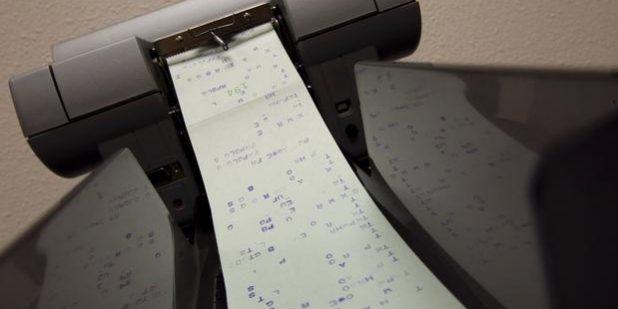Anderson County Assistant District Attorney Trevor Theilen first tried contacting Nancy Currie in May 2010. It was three months after the East Texas prosecutor had lost his case trying to deny a local bail bondsman her license, and he was appealing the verdict.
He needed a transcript of the original trial; without it, the appeal could not get under way. Currie had been the court reporter, the person paid to reproduce every word that was said in court. Now, however, she was nowhere to be found.
When Theilen contacted Currie’s private court reporting company, “I was told she no longer worked there,” he recalled. “They gave me a cellphone number. I would leave message after message trying to get a hold of her.”
It was the start of a vexing game of hide-and-seek that dragged on for nearly a year. Two months ago, all the lawyers and judges gave up trying to track down the official record that Currie, who could not be reached for this story, had made of what was said during the trial a year earlier.
It was a costly decision. No transcript meant that, legally, it was as if the original trial had never happened. The case would have to start all over again from scratch.
Lawyers say such snafus are uncommon. Yet their impact overshadows the frequency.
While judges are masters of their courtrooms and juries dispense justice, court reporters — who typically sit unobtrusively in front of the judge’s bench motionless save for their hands — are like sous chefs and garbage men: simultaneously crucial and anonymous until their performance slips.
“The court,” said Theilen, “is very dependent on its court reporters.” Texas judges have gone as far as throwing tardy reporters behind bars to guarantee completion of an overdue transcript.
The Currie incident is the latest to highlight a quirk in the state’s courtroom record keeping. In a system that is fastidious about its legal documents, in many instances the official record of what is said during a trial is produced, maintained and, according to some readings of the law, outright owned by individual workers who, like Currie, might not even be government employees. When a court reporter disappears, justice can grind to a halt.
“It’s one of the dirty little secrets of our system,” said John Delany, a former state district judge in Brazos County who has crusaded for two decades to change the Texas court reporting system.
The one consolation, Theilen said, is “these aren’t issues that come up that I see very often. That’s why it’s so shocking; it’s so rare.”
But not unheard of. “Nancy Currie?” said Thelma Clardy, a Dallas-area lawyer whose case was stymied last year for lack of a transcript. “So I wasn’t the only one.”
Appeals delayed
In courtrooms, words matter. Whether a person ends up free or in prison can turn on precisely what was said. Appeals depend on the ability of lawyers and judges to examine an exact rendering of who uttered what and when. So mistakes can be monumentally disruptive.
In February 1997, a Kerr County jury found Darlie Lynn Routier guilty of killing her 5-year-old son and sentenced her to death. Her lawyers appealed.
But the due date for the trial transcript to be filed came and went. When Sandra Halsey finally delivered the 15,000-page document — for which she was paid $32,000 — more than a year after the trial, she said she’d nearly had a nervous breakdown producing it.
As Routier’s lawyers began reviewing her work, however, they complained of errors and omissions; the judge who oversaw the trial pronounced the transcript “seriously flawed.” Though Halsey’s spotty record was later ruled an insufficient reason to overturn Routier’s conviction, it delayed the start of her appeals process for three years.
Supporters say that flesh-and-blood scribes add a thinking, acting layer of protection to ensure that what is said during a case is captured accurately.
“Court reporters are a critical part of our process,” said John Rolater, chief of the Collin County district attorney’s appellate division. “You need a person there” not merely to take notes, but “to say, ‘I can’t hear what the witness is saying’ or to tell the lawyers to stop talking over each other.”



